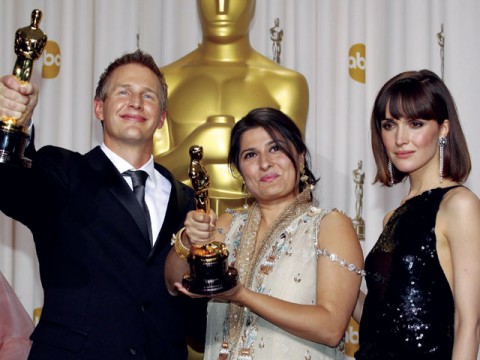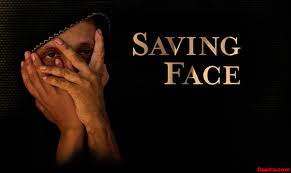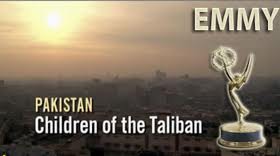
Sharmeen Obaid Chinoy


Sharmeen Obaid Chinoy
Like her colleagues, Sharmeen Obaid Chinoy is one such bold journalist, filmmaker and documentarian, who has not only written many articles about Pakistan and many other countries of Africa and the Muslim world about the plight of women, children and the refugees, but has also used her talent in filmmaking to show to the world the destructive and heinous face of crime, specially when it comes to acid throwing on helpless women in countries, including Pakistan. And it is one of this effort of hers in the form of 52 minutes long documentary 'Saving Face' that has won her and her country Pakistan the first ever Oscar award at the 84 Academy Awards ceremony held on 26 February 2012. The beaming and jubilant Sharmeen raised her Oscar award and dedicated it to the women of Pakistan amid loud roar of applause by the audience. The film has been co-directed by American filmmaker Daniel Junge.

Sharmeen and co-director 'Saving Face' Daniel
holding their Oscars at 84th Academy Awards
The film is a fine tribute to Sharmeen, who despite being a woman, dared to pick up this inhuman practice as subject for her short subject documentary 'Saving Face' and went to limitless end to research the issue by interviewing countless acid victims for making her documentary.


Sharmeen while co-directing a documentary film titled “Saving Face” with Daniel
Junge
Sharmeen was born in Karachi in 1978 and had her basic education from the famous Karachi Grammar School. She then graduated from the Smith College in Economics and Government. But it is here masters in International Policy Studies and in Communication from the Stanford University that paved way for her future in journalism and filmmaking.
 Obaid
rose to the frontline journalism when on behalf of the New York Times
Television, she produced 'Terror's Children', a film about the Afghan
refugee children, which
won her the Overseas Press Club Award, the American Women and Radio and
Television Award, and the South Asian Journalist Association Award. This was
the beginning and since then, Sharmeen has never rested. In 2003 her
documentary 'Reinventing
the Taliban' was
awarded the Special Jury Award at the BANFF TV festival in Canada, the CINE
Golden Eagle Award, the American Women in Radio and Television award, and
the Livingston Award. In 2005, her film 'Women
of the Holy Kingdom,'
which provided an inside look at the women's movement in Saudi Arabia, won
the South Asian Journalist Association Award. In 2005, while working with
Channel 4 in the United Kingdom, her 'Pakistan's
Double Game' looked
at sectarian violence in Pakistan, 'City
of Guilt' explored
the Catholic Church's pro-life movement in the Philippines, 'The
New Apartheid' looked
into growing xenophobia in South Africa, and 'Birth
of a Nationdelved'
into the politics of East Timor. In 2007, Sharmeen was named "Journalist of
the Year" by the One World Media awards for her work in the series. became
the first non-American to win the Livingston
Award.
Obaid
rose to the frontline journalism when on behalf of the New York Times
Television, she produced 'Terror's Children', a film about the Afghan
refugee children, which
won her the Overseas Press Club Award, the American Women and Radio and
Television Award, and the South Asian Journalist Association Award. This was
the beginning and since then, Sharmeen has never rested. In 2003 her
documentary 'Reinventing
the Taliban' was
awarded the Special Jury Award at the BANFF TV festival in Canada, the CINE
Golden Eagle Award, the American Women in Radio and Television award, and
the Livingston Award. In 2005, her film 'Women
of the Holy Kingdom,'
which provided an inside look at the women's movement in Saudi Arabia, won
the South Asian Journalist Association Award. In 2005, while working with
Channel 4 in the United Kingdom, her 'Pakistan's
Double Game' looked
at sectarian violence in Pakistan, 'City
of Guilt' explored
the Catholic Church's pro-life movement in the Philippines, 'The
New Apartheid' looked
into growing xenophobia in South Africa, and 'Birth
of a Nationdelved'
into the politics of East Timor. In 2007, Sharmeen was named "Journalist of
the Year" by the One World Media awards for her work in the series. became
the first non-American to win the Livingston
Award.
It is both sad and happy occasion that a women of the soil wins Pakistan's its first ever Oscar on a documentary film that is about a heinous crime committed in Pakistan - the acid throwing, mostly targeting women - and is thе ѕtοrу οf two women frοm Southern Punjab whο were victims οf acid violence and their battle for justice and their journey of healing.. Although there are no reliable national statistics, but as per an estimate more than hundred cases are reported of people attacked with acid, majority of the victims being women. The figure could even increase if all incidents are reported and registered. The crime is generally committed against wives by the carried out in the family home, by husbands or in-laws or by failed lovers. The life of the acid victims is a nightmare for the rest of their lives living with dis-configured faces, burnt bodies and scars. Acid throwing menace not only happens in Pakistan but most East Asian countries like India, Bangladesh and Cambodia.
The 33-year-old has devoted herself since the last decade in documenting the lives of Pakistan ‘s most vulnerable. shaping and sharing their stories with the rest of the world on a mission for hope. Let us hope that the awareness she has created through this documentary brings a change in the attitude of our people and help stop the violence against women. "Five of Obaid-Chinoy's films concern her native Pakistan, but she has also made documentaries about women in Saudi Arabia, Native American women in Canada, illegal abortions in Philippines, Muslims in Sweden and the ill-treatment of Zimbabwean migrants in South Africa. Her portfolio is a global tour of gender oppression and social injustice." writes Paul Hoggart, The Guardian (June 4, 2007)|
| HOME PAGE | MORE CELEBRITIES | Related Articles: | Sharmeen Obiad Films | Sharmeen Obaid Chinoy (Wikipedia) | Sharmeen Obaid Chinoy's Saving Face wins first ever Oscar for Pakistan | Copyright©JalalsPages - 2012 |